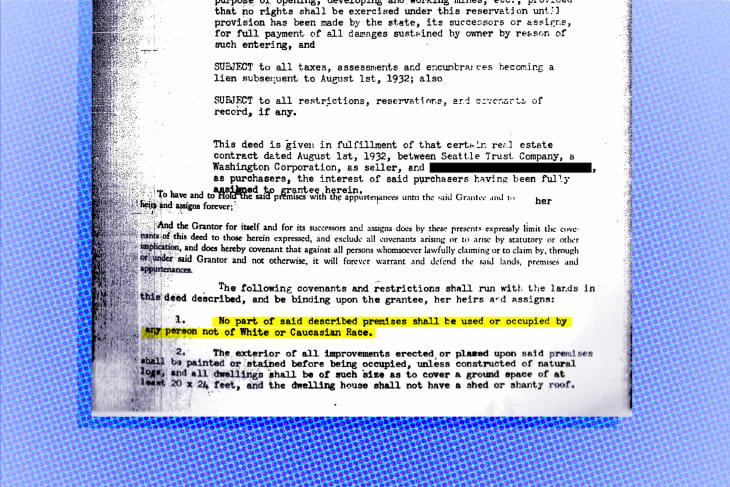What Does It Mean When a House Has a Racial Covenant?
The real estate business has an ugly history of discrimination based on race and ethnicity. Though theFair Housing Act of 1968outlawedhousing discriminationbased on race, religion, national origin, or sex, traces of overt racism in housing are far from erased. For some homeowners, a racial covenant, or a racist clause that prohibits certain groups of people from owning or renting a property, may still exist on the deed to their home.
“A covenant is a promise not to do something,” saysRajeh A. Saadeh, a real estate attorney in New Jersey, pointing out that most covenants are entirely innocuous, and could restrict anything from raising livestock on a property to building a second structure. “A racial covenant is a promise to not allow the title of a property to fall into the hands of a certain type of race, or only be limited to a certain race,” he says.
Indeed, housing discrimination based on race is nothing new. In“Saving the Neighborhood: Racially Restrictive Covenants, Law, and Social Norms,”authors Richard R. W. Brooks and Carol M. Rose cite a claim by historian Leon Litwak, who says a Salem minister complained that the presence of a “Negro hut” would negatively affect his neighborhood back in the 1790s. Fast forward to the 1920s and ‘30s, and racial covenants were entirely accepted, enforceable, and written into real estate documents regularly.
After World War II, real estate developersworked to suburbanizethe country little by little, kickstarting a migration from cities to suburbs known as “white flight.” They created subdivisions in towns that appeared harmless on the surface—but those subdivisions often had racist clauses written into them. Some deeds banned anyone who wasn’t caucasian from living in these homes, with carefully crafted lines like, “No persons of any race other than the white race” or “no person or persons of Asiatic, African or Negro blood.”
Racial covenants are, of course, illegal and unenforceable, thanks to theFair Housing Act of 1968. But some still exist in present-day home deeds. Oftentimes this racist language wasn’t changed or deleted when a deed was passed to a new owner, and through some combination of ignorance and negligence, have remained in documents to this day.
For example, I最近发现2006年的契约the town of Fairhaven, Mass.that reads “This land shall not be sold, leased, or rented to any person other than the Caucasian race or to any entity of which any person other than of said race shall be a member, stockholder, officer, or director.” In Washington, theSeattle Civil Rights & Labor History Project published a shockingly large databaseof home subdivisions with racial covenants.
While it’s impossible to erase racial covenants from historical deeds, current homeowners do have the authority to change them for the future. Saadeh explains you can hire a lawyer and pay to have the covenants removed, redacted, or struck out from the deed.
But the first step in the right direction is finding andreadingyour home’s original deed—something homeowners might forget to do once they’ve closed on a house.

